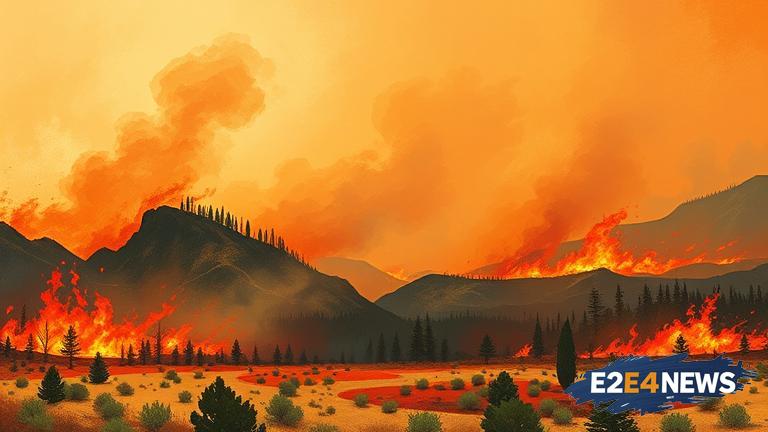The western United States is currently facing an unprecedented crisis as wildfires continue to ravage the region, leaving countless individuals and families displaced and without access to basic necessities. The situation is dire, with flames engulfing everything in their path, from residential areas to vast stretches of wilderness. The wildfires have been fueled by a combination of factors, including scorching temperatures, strong winds, and dry underbrush. As the fires spread, they have destroyed homes, businesses, and infrastructure, causing widespread devastation and disruption. The affected areas are struggling to cope with the aftermath, with many residents forced to flee their homes and seek shelter elsewhere. The wildfires have also had a significant impact on the environment, with air and water quality being severely affected. The situation is being closely monitored by authorities, who are working tirelessly to contain the fires and provide support to those affected. Despite their best efforts, the fires continue to spread, with new blazes erupting daily. The western United States has been experiencing a prolonged period of drought, which has created a tinderbox of dry conditions that are ripe for wildfires. The region’s fire season has been particularly severe this year, with numerous large-scale fires burning across multiple states. The fires have been fueled by strong winds, which have spread embers and sparks over wide areas, igniting new blazes and making it difficult for firefighters to contain the existing ones. The affected states are facing significant challenges in responding to the crisis, including a shortage of resources and personnel. The federal government has deployed additional resources to support the relief efforts, including firefighters, equipment, and funding. However, the scale of the disaster is so vast that it is proving difficult to keep up with the demand for assistance. The wildfires have also had a significant impact on local economies, with many businesses forced to close temporarily or permanently. The tourism industry has been particularly hard hit, with many popular destinations being affected by the fires. The situation is being closely watched by neighboring states, which are bracing themselves for the possibility of the fires spreading across their borders. The long-term effects of the wildfires are still unknown, but it is clear that the region will be dealing with the aftermath for months, if not years, to come. The wildfires have also raised concerns about climate change, with many experts pointing to the role that rising temperatures and changing weather patterns have played in creating the conditions for these devastating fires. As the situation continues to unfold, it is clear that the western United States is facing a crisis of unprecedented proportions, one that will require a sustained and coordinated response from authorities, residents, and the wider community. The road to recovery will be long and difficult, but with the right support and resources, it is possible to rebuild and restore the affected areas. The federal government has pledged to provide ongoing support to the affected states, including funding for relief efforts and rebuilding initiatives. The international community is also watching the situation closely, with many countries offering assistance and support to the United States. The wildfires have brought the community together, with many residents coming forward to offer support and assistance to those affected. The situation is a stark reminder of the power of nature and the importance of being prepared for emergencies. As the western United States continues to grapple with the aftermath of the wildfires, it is clear that the region will never be the same again.
